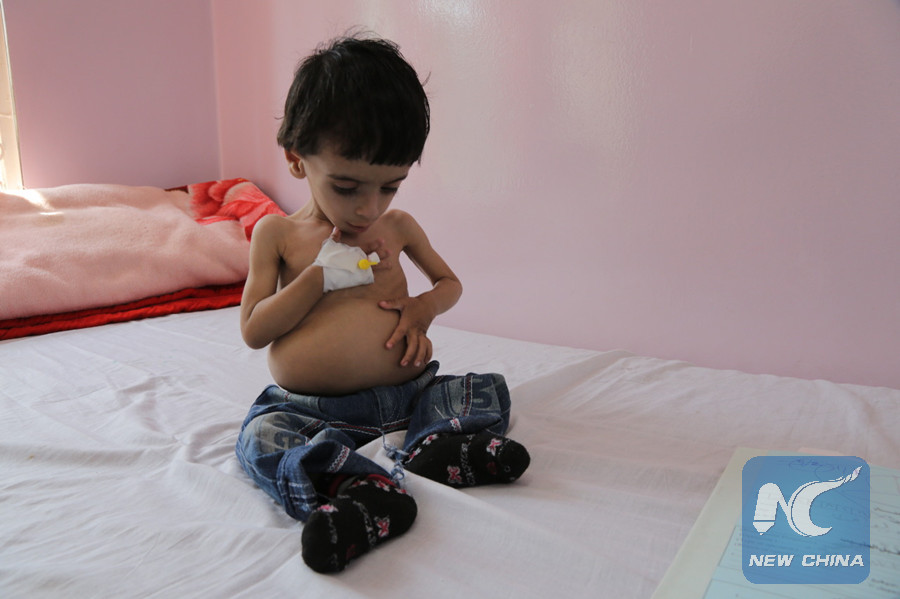
15-month-old stick-like child, Ali Saleh, suffers from malnutrition as he lies in children hospital's emergency unit in the Yemeni capital Sanaa on Tuesday, Sept. 27. (Xinhua/Hani Ali)
by Mohamed al-Azaki
SANAA, Sept. 28 (Xinhua) -- The impoverished Arab country of Yemen is now one step closer to famine, according to a United Nations (UN) report.
People here wonder how much more suffering can 26 million Yemenis bear?
At Al-Sabeen, a state-run maternity hospital in Sanaa, a ward dedicated to childhood malnutrition treatment received 26 emergency cases this month alone.
Fifteen-month-old Ali Saleh is one of the patients. Stick-thin and suffering from persistent diarrhea and vomiting, he was diagnosed with severe malnutrition.
His parents, unable to afford enough food themselves, are also suffering from malnutrition.
"Even the milk they purchased for the child was either expired or spoiled due to poor storage and absent electricity, a typical phenomenon characteristic of wars and blockades," said doctor Abdullah Hajash, who also has to cope with lack of medicine and equipment.
"Malnutrition cases are on the rise, often leading to death, but a small number of patients sometimes recover," he said.
According to a report by the United Nations Children's Fund (UNICEF) issued in March, the number of children under five years old who suffered from moderate malnutrition, at 690,000 before the war, doubled to 1.3 million, many inflicted with severe malnutrition.
The report estimated that 10,000 additional children under five years old died from treatable diseases over the past year due to the breakdown in health services. However, the report had no precise figures of how many children died from malnutrition.
The maternity hospital, located in the south of Sanaa, is in bad shape, its walls full of fissures and most of its windows smashed, after hundreds of almost daily airstrikes on security and military camps and the presidential palace nearby.
The air raids, by a Saudi-led coalition supporting the internationally recognized Yemeni government of President Abd-Rabbu Mansour Hadi against Shiite Houthi rebels controlling Sanaa and much of the country's north, have been going on from March 2015.
Houthi rebels, supported by forces loyal to former President Ali Abdullah Saleh, seized Sanaa and other northern and southern cities in September 2014, forcing Hadi and his government into exile.
The airstrikes and fighting on the ground have killed over 10,000 Yemenis, many of them women and children, and injured around 35,000 others, according to a UN report. Over 3 million have been displaced.
The coalition has imposed air, sea and land blockades in order to economically cripple the rebels, but the move has also choked off the entry of food and medical supplies for residents in the rebel-held northern cities, including Sanaa.
Airstrikes on the capital city have intensified over the past few days, despite a Houthi offer to stop attacking the border areas with Saudi Arabia in exchange for a halt of the coalition's air raids.
Despite failures in repeated peace attempts sponsored by the UN, there seem to be promising new bids at holding fresh negotiations between the warring parties.
On the ground inside Yemen, the situation remains dismal.
The economic situation further deteriorated following Hadi's decision last month to relocate the headquarters of the central bank from the Houthi-held capital Sanaa to the government's temporary southern capital, Aden.
Most state employees have not yet received their August salaries.
And thousands of private sector employees have lost their jobs as many businesses closed due to the economic blockade and ever worsening fuel and power shortages.
Almost all bridges in the northern cities were hit, as were many other vital service facilities, such as hospitals, schools, highways and shops, depriving residents of water, food and electricity.
Many families in Sanaa subsist on just one meal a day.
Women and children can often been seen rummaging garbage in search of scraps of food.
Mosques have opened their doors to impoverished families in need of food and shelter, as many families cannot afford to rent a house and sleep on the streets instead.
"I have never seen this much destruction in my life, nor heard of anything similar from my father or ancestors," said 70-year-old Yahya al-Zuani, who was giving bread to some poor families camping out on the roadside in the capital city's old quarters.
"How many more months or years could this go on?" al-Zumani asked. "How much more suffering can 26 million Yemenis bear?"

